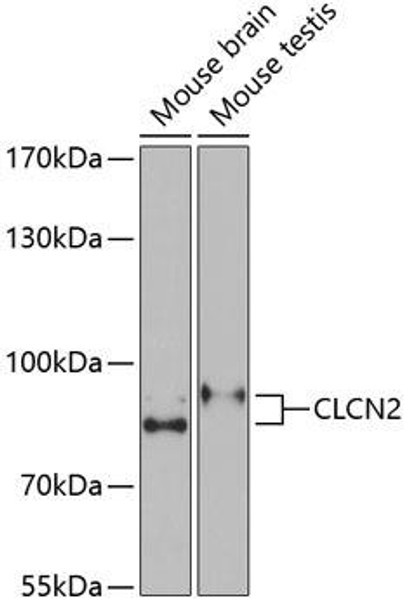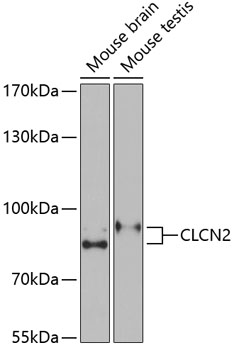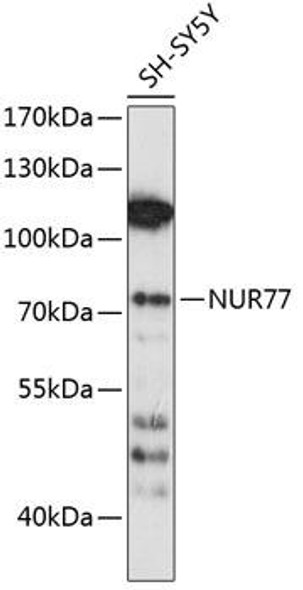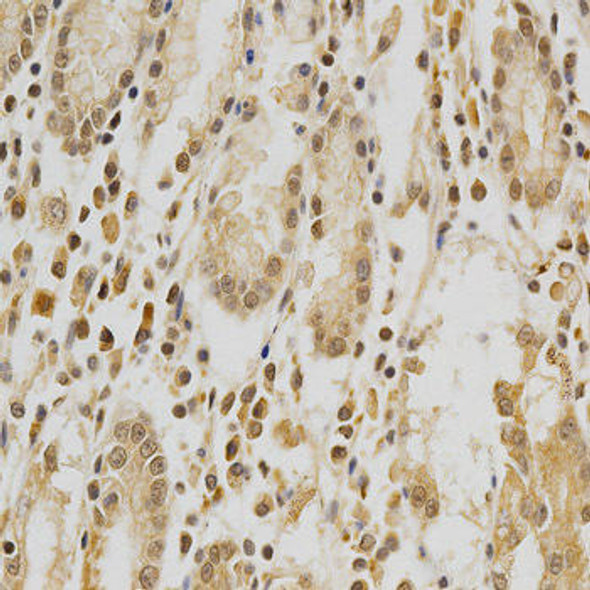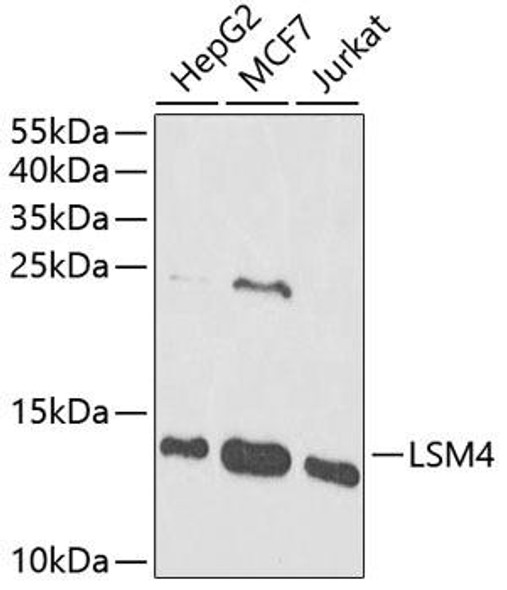Description
Anti-CLCN2 Antibody (CAB6120)
The CLCN2 Polyclonal Antibody (CAB6120) is a valuable tool for researchers studying the CLCN2 protein, an important ion channel involved in various physiological processes. This antibody, produced in rabbits, has high reactivity with human samples and has been verified for reliable use in Western blot applications. By targeting the CLCN2 protein, this antibody enables precise detection and analysis in different cell types, making it ideal for investigations in the fields of neuroscience, cardiology, and nephrology.CLCN2 is a chloride channel that plays a crucial role in maintaining chloride homeostasis in cells, impacting processes like membrane potential, fluid balance, and acid-base regulation.
Dysregulation of CLCN2 has been associated with diseases such as epilepsy, cardiac arrhythmias, and certain kidney disorders. Therefore, studying the function of CLCN2 using this polyclonal antibody can provide insights into these conditions and potentially lead to the development of novel therapeutic strategies targeting CLCN2 function.
| Antibody Name: | Anti-CLCN2 Antibody |
| Antibody SKU: | CAB6120 |
| Antibody Size: | 20uL, 50uL, 100uL |
| Application: | WB |
| Reactivity: | Human, Mouse |
| Host Species: | Rabbit |
| Immunogen: | A synthetic peptide corresponding to a sequence within amino acids 800 to the C-terminus of human CLCN2 (NP_004357.3). |
| Application: | WB |
| Recommended Dilution: | WB 1:500 - 1:2000 |
| Reactivity: | Human, Mouse |
| Positive Samples: | Mouse brain, Mouse testis |
| Immunogen: | A synthetic peptide corresponding to a sequence within amino acids 800 to the C-terminus of human CLCN2 (NP_004357.3). |
| Purification Method: | Affinity purification |
| Storage Buffer: | Store at -20'C. Avoid freeze / thaw cycles. Buffer: PBS with 0.02% sodium azide, 50% glycerol, pH7.3. |
| Isotype: | IgG |
| Sequence: | RTSL HKTH TIFS LLGV DHAY VTSI GRLI GIVT LKEL RKAI EGSV TAQG VKVR PPLA SFRD SATS SSDT ETTE VHAL WGPH SRHG LPRE GSPS DSDD KCQ |
| Gene ID: | 1181 |
| Uniprot: | P51788 |
| Cellular Location: | Cell membrane, Multi-pass membrane protein |
| Calculated MW: | 14kDa/93kDa/95kDa/96kDa/98kDa |
| Observed MW: | 90-98kDa |
| Synonyms: | CLCN2, CIC-2, CLC2, ECA2, ECA3, EGI11, EGI3, EGMA, EJM6, EJM8, LKPAT, clC-2 |
| Background: | This gene encodes a voltage-gated chloride channel. The encoded protein is a transmembrane protein that maintains chloride ion homeostasis in various cells. Defects in this gene may be a cause of certain epilepsies. Four transcript variants encoding different isoforms have been found for this gene. |
| UniProt Protein Function: | CLCN2: Voltage-gated chloride channel. Chloride channels have several functions including the regulation of cell volume; membrane potential stabilization, signal transduction and transepithelial transport. Defects in CLCN2 are associated with susceptibility to epilepsy, idiopathic generalized type 11 (EIG11). A disorder characterized by recurring generalized seizures in the absence of detectable brain lesions and/or metabolic abnormalities. Generalized seizures arise diffusely and simultaneously from both hemispheres of the brain. Defects in CLCN2 are associated with juvenile absence epilepsy type 2 (JAE2). JAE is a subtype of idiopathic generalized epilepsy (IGE) characterized by onset occurring around puberty, absence seizures, generalized tonic- clonic seizures (GTCS), GTCS on awakening and myoclonic seizures. Defects in CLCN2 are associated with juvenile myoclonic epilepsy type 8 (EJM8). A subtype of idiopathic generalized epilepsy. Patients have afebrile seizures only, with onset in adolescence (rather than in childhood) and myoclonic jerks which usually occur after awakening and are triggered by sleep deprivation and fatigue. Belongs to the chloride channel (TC 2.A.49) family. ClC-2/CLCN2 subfamily. 3 isoforms of the human protein are produced by alternative splicing. |
| UniProt Protein Details: | Protein type:Membrane protein, integral; Transporter; Transporter, ion channel; Channel, chloride; Membrane protein, multi-pass Chromosomal Location of Human Ortholog: 3q27.1 Cellular Component: plasma membrane Molecular Function:voltage-gated chloride channel activity Biological Process: transport Disease: Epilepsy, Idiopathic Generalized, Susceptibility To, 11; Leukoencephalopathy With Ataxia |
| NCBI Summary: | This gene encodes a voltage-gated chloride channel. The encoded protein is a transmembrane protein that maintains chloride ion homeostasis in various cells. Defects in this gene may be a cause of certain epilepsies. Four transcript variants encoding different isoforms have been found for this gene. [provided by RefSeq, Mar 2012] |
| UniProt Code: | P51788 |
| NCBI GenInfo Identifier: | 288558807 |
| NCBI Gene ID: | 1181 |
| NCBI Accession: | P51788.2 |
| UniProt Secondary Accession: | P51788,O14864, Q6IPA9, Q8WU13, B4DQT9, B4DZ58, E9PBD9 E9PCD2, |
| UniProt Related Accession: | P51788 |
| Molecular Weight: | 95,399 Da |
| NCBI Full Name: | Chloride channel protein 2 |
| NCBI Synonym Full Names: | chloride voltage-gated channel 2 |
| NCBI Official Symbol: | CLCN2 |
| NCBI Official Synonym Symbols: | CLC2; ECA2; ECA3; EGI3; EGMA; EJM6; EJM8; CIC-2; EGI11; LKPAT; clC-2 |
| NCBI Protein Information: | chloride channel protein 2 |
| UniProt Protein Name: | Chloride channel protein 2 |
| Protein Family: | Chloride channel protein |
| UniProt Gene Name: | CLCN2 |
| UniProt Entry Name: | CLCN2_HUMAN |

